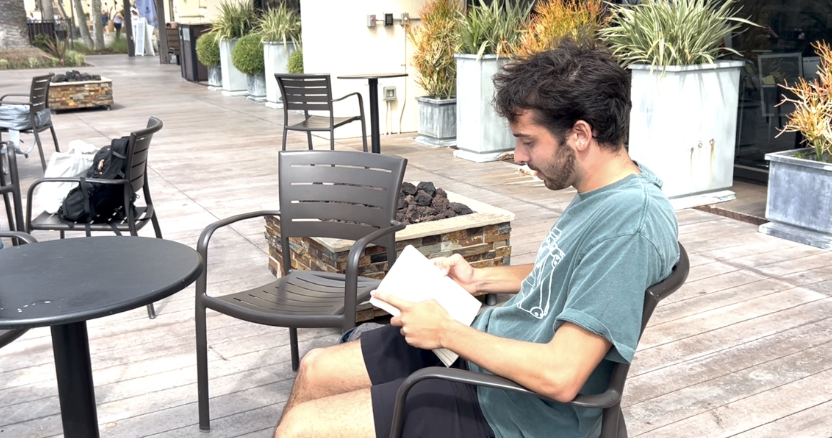
When applying for universities, junior economics major Leah Marquell was drawn to the strong academics at Pepperdine and the idea of moving across the country.
But people at home in Fort Wayne, Indiana, were nervous for her. Coming in, Marquell herself said she was worried about California culture, meeting the right people and finding her place, on top of the hyper-stress around college that her boarding school instilled in her.
Marquell said she was relieved by the excitement of her new life in Malibu.
“It’s so cool to look back and think about everything I was worried about and everything I was scared of, not end up being an issue,” Marquell said.
The reality of Pepperdine surpassed Marquell’s expectations. But for other students, expectations ran higher, and reality disappointed them. This generally depended on each student’s starting lens.
Hometowns shape students’ perceptions of college
For many students, their upbringing bred their perceptions of college and informed their expectations of coming to Pepperdine.
Hubert Laws McCullough (H.L.), junior business administration major, said his family has been living in Murfreesboro, Tennessee for about 250 years, so coming to Pepperdine was out of the ordinary.
All students said football is a big aspect of college. In Tennessee, college is about getting a better job and tailgating, McCullough said.
Marquell said college culture in Indiana was focused around basketball.
“I really associated college with sports and basketball and football teams,” Marquell said. “Everyone went for a purpose but had a lot of fun doing it.”
“In Indiana, college experience is based on their communities, and it’s very people-focused,” Marquell said.
Similarly, junior psychology major Regan Rowe said college is depicted as really fun in Seattle, Washington.
“Everyone has lots of school pride,” Rowe said. “It seemed to be something I was really excited for.”
Rowe said hiking is a large part of life in the Pacific Northwest and that colleges there have many skiing and hiking club opportunities.
“My dad went here and that was really why I went,” Rowe said. “And scholarship.”
Leo Hawke, a junior double major in Hispanic and international studies, described college in Malvern, Pennsylvania, as people walking around with books in the fall.
“I associate East Coast college with a sense of being collegiate, ” Hawke said. “There’s an aura about it that is like ‘This is college.’”
To him, college was about getting that first taste of freedom. “You do dumb stuff but also work hard,” Hawke said.
Media shapes students’ expectations
Hawke said social media also shaped his perceptions of college, especially with seeing Penn State games and traditions on Instagram.
“I thought college was just going to be super fun and parties all the time,” Rowe said. “I just thought there would be a certain energy that doesn’t exist at Pepperdine.”
McCullough said he watched many YouTube videos about Pepperdine and the marketing team did an excellent job in persuading him to come.
Marquell said she watched “day-in-the-life” videos of students who went to schools she was considering.
Screen Arts Professor Laci Dent said movies about college are an entire genre, and they tend to exhibit only the dramatized parts of college life.
College movies tend to showcase Greek life, most famously in National Lampoon’s Animal House.
“It’s unhealthy to consume lots of media about college when it is not the same reality as life,” Dent said.
Research suggests that watching a lot of fictional college media leads young people to positively associate college with partying and socializing, Roland Nuñez wrote in a 2018 Educational Media International study on college in the media.
Another study found troubling themes across college-experience social media sites, such as white-centricism, male dominance and female objectification, said Stefanie Davis. This is also found in many college movies such as The House Bunny.
Pepperdine students said they didn’t really turn to movies to shape their expectations of college life, except for Hawke anticipating a scenic California from movies like La La Land. McCullough and Rowe said they didn’t know what Zoey 101 — a television show filmed on campus — was until they got to Pepperdine.
Reality sinks in
With hometown experiences and media shaping expectations, the first couple months at Pepperdine posed different circumstances for each.
McCullough said adjusting to California culture was a reality check since it is way different from Tennessee.
“I grew up saying hi to everyone I see,” McCullough said. “People were shocked by that here. People would look at me and be like ‘What’s this guy doing?’”
Marquell said she was worried that California culture would pose challenges since it was way different from Indiana.
“I like Pepperdine a lot more than I thought I would,” Marquell said. “I had fears about Christian community and a sense of belonging, but I have definitely found that here.”
Rowe said she was disappointed by the lack of skiing and hiking clubs.
“When I got to Pepperdine, it was kind of dead here,” Rowe said. “And my friends thought it was a Puritan school when they heard about the behavior contract we have to sign.”
Rowe said she was disappointed by the rules and the sense of materialism at Pepperdine.
Similarly, for Hawke, he said the lack of sports and party scenes disappointed him at first.
“NSO felt like a summer camp,” Hawke said. “And you can definitely feel the administrative hand here, especially at NSO.”
Challenges faced
With students experiencing different degrees between their expectations versus their realities in coming to college and attending Pepperdine, there were always things to learn.
Sergio Gallardo Palma, the associate director for Resilience-Informed Skills Education program, or RISE, said his team sees so many students who have many different experiences coming into Pepperdine.
“Expecting challenges is the key to facing adversity,” Palma said. “It’s natural to have expectations in coming to college, but knowing that those might not all be met or things will be different helps a lot.”
Hawke said he knew there’d be differences, but his expectations of living in California were not met when he discovered how Pepperdine can feel like a bubble.
“Pepperdine is kind of a part of the Malibu community, but not really,” Hawke said. “Even Malibu is so isolated from LA.”
Rowe said she had a difficult transition coming to Pepperdine and it was hard for her to figure out how to play the game.
“It took all of freshman year to make that adjustment,” Rowe said.
Palma said it is important for students to be intentional for holistic health and to approach expectations versus reality with a growth mindset, which the RISE program helps with.
“Our RISE program isn’t toxic positivity,” Palma said. “It’s about going through adversity rather than from it.”
For students experiencing challenges that are a result of unmet expectations about college, Palma said to lean on one’s community, as Pepperdine offers resources like the Counseling Center and Student Success Center.
“If their community is Pepperdine, there are so many resources,” Palma said. “We call it a quilt of care.”
Pepperdine can pose different challenges or provide benefits for students, it depends on their background and expectations. It can help students to know that needing time to adjust is common, Palma said, and they help students move through these circumstances with resilience.
“It is so helpful to really make time for those things that are important,” Palma said.
Jessie Furrow reported this enterprise story in Jour 241 during the Fall 2024 semester under the supervision of Dr. Christina Littlefield and Dr. Theresa de los Santos. Dr. Littlefield supervised the web article.




